

Cultural Competence / Diversity. House Health Committee Votes for Better Data Amid Talk of Cultural Competency. Editor's note: The vote on HB 2134 has been corrected from an earlier version.
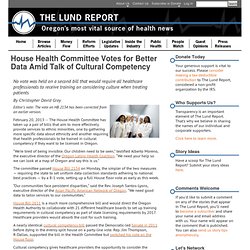
February 20, 2013 -- The House Health Committee has taken up a pair of bills that aim to more effectively provide services to ethnic minorities, one by gathering more specific data about ethnicity and another requiring that health professionals to be trained in cultural competency if they want to be licensed in Oregon. “We’re tired of being invisible.
Our children need to be seen,” testified Alberto Moreno, the executive director of the Oregon Latino Health Coalition. “We need your help so we can look at a map of Oregon and say this is us.” The committee passed House Bill 2134 on Monday, the simpler of the two measures — requiring the state to set uniform data collection standards adhering to national best practices — by a 8-1 vote, setting up a full House floor vote as early as this week. Center for Diversity and Inclusion at Michigan Tech. The Center for Diversity and Inclusion’s Cultural Competency Training model was launched in 2011.
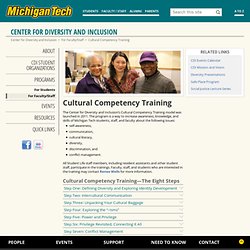
The program is a way to increase awareness, knowledge, and skills of Michigan Tech students, staff, and faculty about the following issues: self-awareness,communication,cultural literacy,diversity,discrimination, andconflict management. All Student Life staff members, including resident assistants and other student staff, participate in the trainings. Faculty, staff, and students who are interested in the training may contact Renee Wells for more information.
Library. Sunrise Packaging Blog. The job losses and pay cuts experienced by many people throughout the country have brought on new roles for librarians.
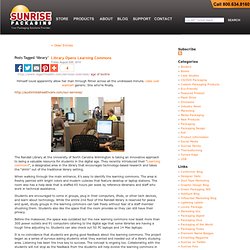
Libraries are no longer just a place to check out books, music, and videos for free. They are a place for the unemployed to go seeking comfort and help during hard times. An article in The New York Times described the new stresses put on libraries. Without as much money to spend on leisure, more and more people are turning to the libraries’ free resources and entertainment. Libraries are serving a whole new crowd of users. Many libraries are now offering job-search desks, help writing résumés, and workshops to bring hope to the jobless. More than ever before, people are turning to libraries for entertainment, job-help, and emotional support. Diversity Counts. Diversity Counts is a comprehensive study of gender, race and age in the library profession, originally conducted in 2006 and released in 2007.
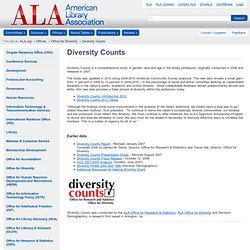
The study was updated in 2012 using 2009-2010 American Community Survey analyses. African American History: Bibliography. The books listed below represent some of the best works on various subjects related to African American history.
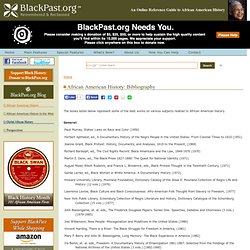
General: Pauli Murray, States’ Laws on Race and Color (1950) Herbert Aptheker, ed., A Documentary History of the Negro People in the United States: From Colonial Times to 1910 (1951) NewSouth Books. Nicholas Katzenbach, former Attorney General of the United States, died on May 8 at age 90 and was widely memorialized as an important figure in the civil rights movement of the 1960s.
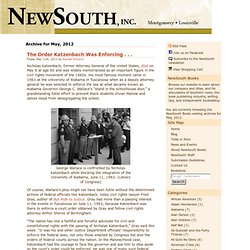
His most famous moment came in 1963 at the University of Alabama in Tuscaloosa when as a deputy attorney general he was selected to enforce the law at what became known as Alabama Governor George C. Wallace’s “stand in the schoolhouse door,” a grandstanding futile effort to prevent black students Vivian Malone and James Hood from desegregating the school. Pathfinders. General Purpose Reading multicultural literature can help children gain a better understanding of people from other countries and ethnic backgrounds.
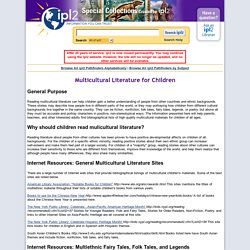
These stories may describe how people live in different parts of the world, or they may portraying how children from different cultural backgrounds live together in the same country. They can be fiction, nonfiction, folk tales, fairy tales, legends, or poetry, but above all they must be accurate and portray characters in positive, non-stereotypical ways. The information presented here will help parents, teachers, and other interested adults find bibliographical lists of high quality multicultural materials for children of all ages. American Community Survey Main. Extending Our Reach: Reducing Homelessness Through Library Engagement. Model Programs Baltimore County (Mary.)
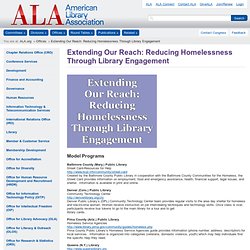
Public Library.
Librarians are Like Social Workers, at Least in LA. William Kamkwamba: How I built a windmill. William Kamkwamba. William Kamkwamba, author, "The Boy Who Harnessed the Wind," and Malawi Windmill Maker. Working with immigrant and refugee populations: issues and Hmong case study. <a href=" with immigrant and refugee populations: issues and Hmong case study.
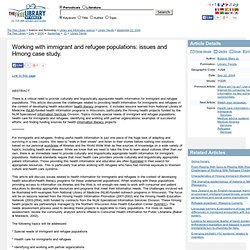
</a> There is a critical need to provide culturally and linguistically appropriate health information for immigrant and refugee populations. Immigration - Key Measures - Minnesota Compass. Cultural Competency Resources - Educator Development and Research Center - Univ. of Minn. NHCOA E-Learning Center. New Diversity Standards: Cultural Competency for Academic Libraries. October 31st, 2012 by David Free in Diversity, Standards and Guidelines No Comments The ACRL Board of Directors has approved new “Diversity Standards: Cultural Competency for Academic Libraries.”
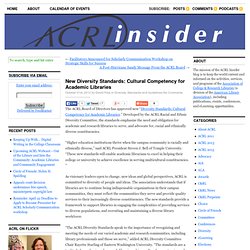
Developed by the ACRL Racial and Ethnic Diversity Committee, the standards emphasize the need and obligation for academic and research libraries to serve, and advocate for, racial and ethnically diverse constituencies. “Higher education institutions thrive when the campus community is racially and ethnically diverse,” said ACRL President Steven J. Diversity Standards: Cultural Competency for Academic Libraries (2012) Purpose and Goals of the Standards The following standards were developed by the Racial and Ethnic Diversity Committee of ACRL (Association of College & Research Libraries), based on the 2001 National Association of Social Workers Standards for Cultural Competence in Social Work Practice.1 The standards are intended to emphasize the need and obligation to serve and advocate for racial and ethnically diverse constituencies.
As such, they are intended to apply to all libraries supporting academic programs at institutions of higher education. InclusionINC - Our Team. InclusionINC - Our Clients. InclusionINC is proud to highlight many of our clients. View the testimonials below to read what our clients say about us in their own words and see a list of many of the clients we have worked with through the years! {*style:<b> Director, Educational Institution </b>*}
Gapminder: Unveiling the beauty of statistics for a fact based world view. - Gapminder.org. TED: Statistics: Visualizing Data. Invisible Dream. Hard Work Is Essential for Achieving the American Dream, But Is It Enough? Americans Are Divided According to a New Survey. Demographics of the United States. Largest ancestry groups by county, 2000. As of April 15, 2014, the United States has a total population of 317.8 million,[1] making it the third-most populous country in the world.[2] It is very urbanized, with 82% residing in cities and suburbs as of 2011 (the worldwide urban rate is 52%).[3] California and Texas are the most populous states,[4] as the mean center of U.S. population has consistently shifted westward and southward.[5] New York City is the most populous city in the United States.[6] The total fertility rate in the United States estimated for 2012 is 1.88 children per woman,[8] which is below the replacement fertility rate of approximately 2.1.
Public Library Use. The American Library Association is often asked to answer questions about public libraries: How are they used, who is using them, and what do people think of them? This ALA Library Fact Sheet is designed to help answer these questions. It contains information from recent studies that document public library use and opinions held by individuals about public libraries.
Most Recent Resources on Library Use and Services State of America's Libraries: A Report from the American Library Association | Libraries Connect Communities: Public Library Funding and Technology Access Study (PLFTAS) | Usage Reported By Libraries - Public Library Survey (PLS) federal report | Library Card Holders | Usage Reported By Households | Usage Reported By Racial/Ethnic Group | Library Use Studies - User-specific | Notable Previous Reports | State of America's Libraries: A Report from the American Library Association.
Public Library Use. InterConnections Survey Results. National Poverty Center. Stresses of poverty may impair learning ability in young children, August 28. NIH funded research suggests stress hormones inhibit brain function, stifle achievement The stresses of poverty — such as crowded conditions, financial worry, and lack of adequate child care — lead to impaired learning ability in children from impoverished backgrounds, according to a theory by a researcher funded by the National Institutes of Health. The theory is based on several years of studies matching stress hormone levels to behavioral and school readiness test results in young children from impoverished backgrounds.
Institute for Research on Poverty. 2777. Viewcontent.cgi?article=1199&context=seln&sei-redir=1&referer=http%3A%2F%2Fscholar.google.com%2Fscholar_url%3Fhl%3Den%26q%3Dhttp%3A%2F%2Fdigitalcommons.kennesaw.edu%2Fcgi%2Fviewcontent.cgi%253Farticle%253D1199%2526context%253Dseln%26sa%3DX%26scisig%3DAAGB. Presentations From: The Homeless and the Libraries – The Right to Information and Knowledge For All. The Problem Is Not the Homeless. Libraries And The Homeless: Random Thoughts. I first became homeless in February of 1982, 27 years ago. Since then, I have spent about half of my life homeless.
That's 13 years of literal homelessness. Arriving for the first time in Nashville, a city I had never been to before, and becoming homeless, happened simultaneously. I knew practically nothing about the city of Nashville. So my first days of homelessness were spent mostly hovering around the rescue mission. During a later episode of homelessness I came to realize just how ignorant most people were about homelessness, so I was inspired to create a newsletter of sorts, that I planned to hand out to people working in the downtown area.
Fast forward a year and a half later and I'm homeless again. Tomgram: Ward, How the Public Library Became Heartbreak Hotel. Back in the 1950s, when every domestic scandal and nightmare, political or familial, wasn't the subject of a television show, the library was my peephole into the mysteries of the adult universe. The key question, when it came to interpreting the world back then, was this: Would the librarian who ruled over the juvenile section free you to enter the pay dirt of the rest of the library? Mine did. As a friend of mine, who arrived in this country as an immigrant at age 11, used to say of her library years, "I started with A. " So did I. What an essential democratic institution the public library is.
Of course, today, the condition of America's public libraries is, at best, wildly variable . Many public libraries are experimenting with new roles beyond the boundaries of story hour and homework help. Mick is having a bad day, too. John is trying hard not to be noticed. Franklin sits quietly by the fireplace and reads a magazine about celebrities. Scenes from a psych ward?
Street Spirit: Justice News&Homeless Blues. By Sanford Berman Homeless people sit outside the San Francisco Public Library adjacent to United Nations Plaza. Lydia Gans photo Why the cascading efforts to exclude homeless people from public spaces, deny them fair access to library resources, and treat them as pariahs? It seems to result from living in a plutocracy where money and wealth not only rule, but also determine status and social worth.
Trippin’ Over the Color Line: The Invisibility of Race in Library and Information Studies.